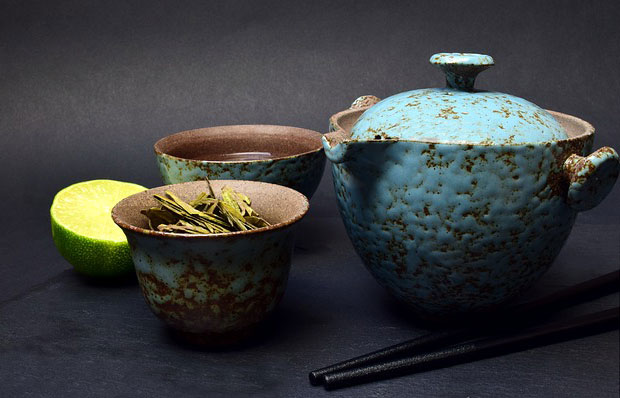Love your tea but want to reduce the caffeine intake? No problem. Instead of choosing decaffeinated types, try changing the way you brew. Caffeine in tea is a complex topic. The exact amount is impossible to guess without testing each and every tea separately. Still, that doesn't mean you don't have any control over your tea leaves.
What is caffeine?
Caffeine is a psychostimulant. The most popular natural sources of caffeine are coffee, tea, yerba mate, guarana and - cocoa bean. Yes, chocolate has caffeine too, even more than a cup of low-strenght tea. Althouhg caffeine may have some benefits, it can also cause nervousness and impact the quality of your sleep. And that's the main reason why some tea drinkers refuse a cup even when all they can think about is tea.
How much caffeine in a cup of tea?
Studies showed that an average cup of tea may contain anywhere from 14-61mg of caffeine[1]. This amount can, of course, be lower or higher, but it will rarely be higher than in a regular cup of coffee. Surprisingly, studies say that the caffeine levels in dry tea leaves and dry roasted coffee beans are quite similar – but the extraction rate is very different[2].
How much caffeine in different types of tea?
Unlike the common belief, black teas aren't necessarily the strongest ones. Sometimes white or green tea can have much more caffeine than black tea. For example, White Peony white tea may have more caffeine than black Darjeeling tea, and Darjeeling may have more than ripe Pu'erh. In fact, White Peony may have twice as much caffeine than Yunnan green tea, a tea that could make you think it's stronger than any other green tea in the world.[3] The truth is that without proper tests, it's impossible to say how much caffeine your tea will have. But, you can still guess which tea could potentially have the least caffeine.
There are many things to look at when choosing the tea with the least amount of caffeine.
- Tea cultivar
Caffeine content will depend on the tea plant used for making tea. All real teas are made from Camellia sinensis, but there are thousands of different cultivars. A study that included about 1500 different tea cultivars from around the world showed that on average, tea from India will have more caffeine than tea from Japan[4].
- Harvesting time
Harvesting time has an influence on caffeine content as well. Teas harvested in spring and summer will usually have more caffeine than teas harvested in autumn and winter.
- Leaf type
Tea leaves come in many shapes and grades. From full unroken long leaves to tea dust and fannings packed in teabags. Interestingly, the smaller tha leaf particle, the higher the caffeine content will be. Assam tea dust could have three times more caffeine than full leaf Assam tea[5].
- Processing method
Processing method will have an impact on the levels of caffeine too. For example, roasted teas like hojicha will have less caffeine than unroasted green types, such as sencha.
Read more about caffeine levels in different tea types.

Does caffeine depend on the water temperature?
How much caffeine you will have in your cup of tea will depend on how you brew it and how much leaf you will use. Even the amount of water can have an influence too.
Caffeine extraction does not only depend on the water temperature, but on the steeping time as well. For example, 5 minute steep can extract even the three times more caffeine than a 1 minute steep[6]. But when we look at different water temperatures, starting from 50 to 90 degrees Celsius and regular and very long brewing times, everything gets even more confusing. The most caffeine from green tea will be released in the first 20 minutes at 80 degrees. 20 minute steep at 50 degrees could result in a cup that has more than 50% less caffeine.
One hour of cold or room temperature brewing at 10 degrees will extract 50% less caffeine than a 2 minutes steep at 80 degrees[7]. But after one hour the levels are likely to stay the same. Even a whole night steeping, won't have a much impact on the total caffeine content.The good news? Catechin extraction will still be high if you leave your tea leaves to steep at room temperature for 2 hours[8].
Gyokuro and caffeine
Gyokuro is a perfect example how complicate the caffeine in tea story is. It's one of those teas that can give a super high caffeine kick. And it's green. Gyokuro is usually brewed with very cool water, at around 40-60 degrees Celsius. So how it it possible it's so strong? Firtly, gyokuro has naturally high caffeine levels. Next, it's grown under shade, and nitrogen fertilizers are often used for fertilization. They could increase the caffeine content too[9]. Thirdly, you brew Gyokuro using much more tea leaves per ml of water, getting a very concentrated infusion. And lastly, it's always re-steeped. Firstly with low temperature, then higher, until all flavor is gone and most of aminoacids, caffeine and antioxidant are extracted. Makes sense?
Next time you want to reduce the caffeine content, try cold-brewing.
Sources:
[1] https://www.researchgate.net/publication/23471909_Caffeine_Content_of_Brewed_Teas
[2] https://www.scielo.br/scielo.php?script=sci_arttext&pid=S0101-20612018000400661
[3] https://www.researchgate.net/publication/319682455_Study_of_nutritional_value_of_dried_tea_leaves_and_infusions_of_black_green_and_white_teas_from_Chinese_plantations
[4] file:///C:/Users/Point-1/AppData/Local/Temp/28-2-117-123_0.pdf
[5] https://www.ncbi.nlm.nih.gov/pmc/articles/PMC5380613/
[6] https://www.researchgate.net/publication/23471909_Caffeine_Content_of_Brewed_Teas
[7] https://www.jircas.go.jp/sites/default/files/publication/jarq/52-01-01_001-006_MONOBE.pdf
[8] https://www.researchgate.net/publication/277335709_Influence_of_steeping_conditions_time_temperature_and_particle_size_on_antioxidant_properties_and_sensory_attributes_of_some_white_and_green_teas
[9] https://link.springer.com/article/10.1007/s13593-017-0485-z



Drinking tea is a kind of mood to drink, drinking is a kind of leisure, drinking tea is also very particular, not only depends on the quality of the tea, but also depends on the temperature of the water and the water used to make the tea
Thank you so much for providing this information, Unjhawala Tea is a leading processor and Exporters of Premium grain tea, Green Tea, and Powder tea. For more information, you can visit the website http://unjhawalatea.in/